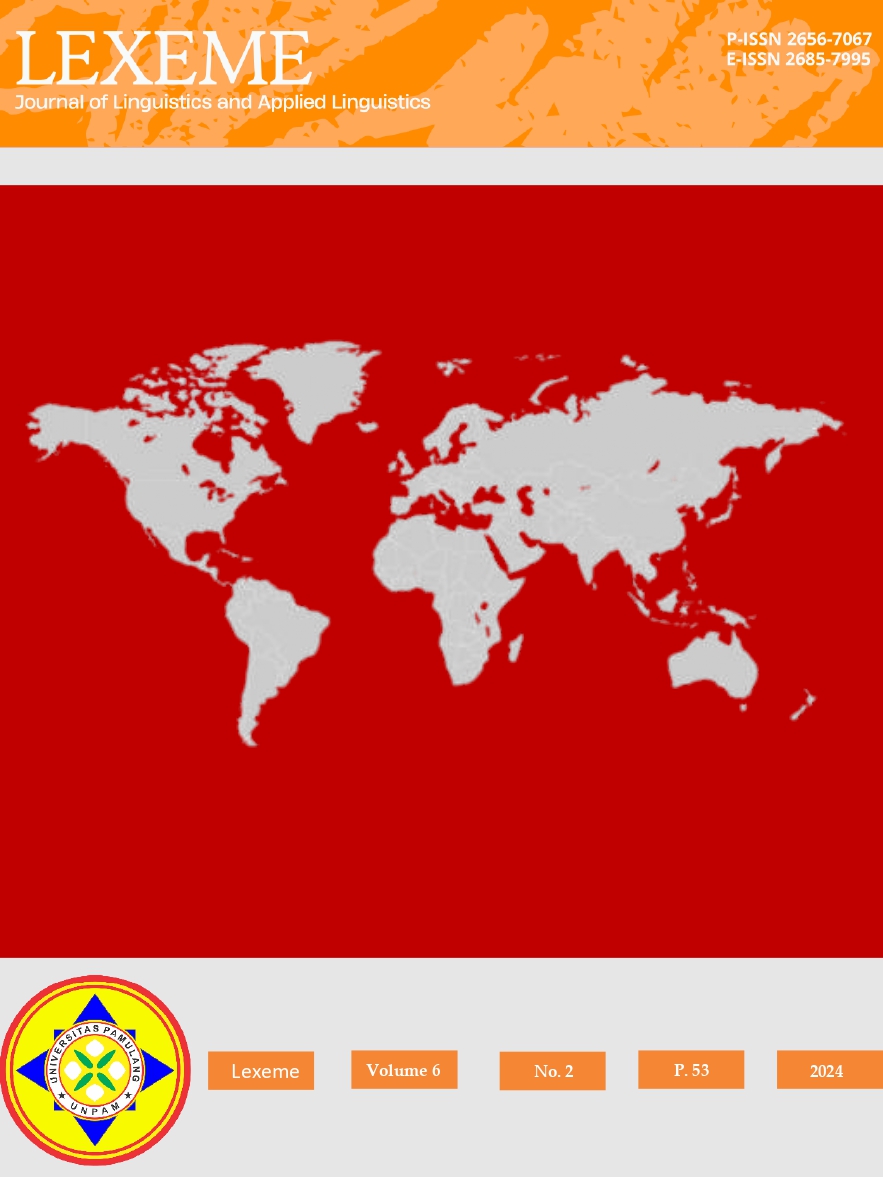Exploring Language Variations in Communication between Sellers and Buyers
DOI:
https://doi.org/10.32493/ljlal.v6i2.41665Keywords:
communication, language variation, traditional market, MataramAbstract
As part of a community, we use language to interact and communicate with other group members, in various speech events. The use of language to speak is a form of cultural practice to share ways of doing things, ways of speaking, beliefs and values. Cultural and linguistic diversity can show where we come from and what kind of community we live in. One of the domains where speakers from various backgrounds carry out social interactions is traditional markets. Buyers and sellers from various backgrounds communicate to carry out transactions until reaching an agreement on price. The variety of languages used by sellers and buyers when interacting to agree on prices is of interest to researchers. The research method used is descriptive qualitative using a sociolinguistic approach, to see the relationship between language use and the community at the location of the speech event. The research location was carried out at the Pagutan market, which is located in a Sasak-majority area, but is now the area of choice for immigrants from various regions. The results of this research show that the variety of languages used at Pagutan Mataram Market is influenced by the way we speak and also pays attention to socio-cultural background, age, gender, race and social status.
References
Agustina, I., Hariadi, J., & Hidayat, T. (2021). Variasi Bahasa Pedagang Di Pasar Penanggalan Kota Subulussalam , Provinsi Aceh. Peningkatan Mutu Pendidikan, 2(1), 116–121.
Ary, D., Jacobs, L. C., & Sorensen, C. (2010). Introduction to Research in Education. Wadsworth, Cengage Learning.
Brown, A., & Gullberg, M. (2012). Multicompetence and native speaker variation in clausal packaging in Japanese. Second Language Research, 28(4), 415–442. https://doi.org/10.1177/0267658312455822
Fakihuddin, L. (2013). Keunikan Sapaan dan Panggilan Dalam Bahasa Sasak Dialek Nggeto-Nggete. Mabasan, 7(1), 10–16. https://doi.org/https://doi.org/10.62107/mab.v7i1.168
Field, M. (2012). Kumeyaay Language Variation , Group Identity , and The Land Author ( s ): Margaret Field Source : International Journal of American Linguistics , Vol . 78 , No . 4 ( October 2012 ), pp . 557- Published by : The University of Chicago Press Stable URL : htt. International Journal of American Linguistics, 78(4), 557–573. International Journal of American Linguistics
Harris, J. (1984). Syntactic Variation and Dialect Divergence. Journal of Linguistics, 20(2), 303–327. https://www.cambridge.org/core/journals/journal-of-linguistics/article/abs/syntactic-variation-and-dialect-divergence/58E266A61901E15E10B3705960004B6C
Hazen, K. (2002). Identity and language variation in a rural community. Language, 78(2), 240–257. https://doi.org/10.1353/lan.2002.0089
Holmes, J. (1995). Women, Men and Politeness. In Вестник Росздравнадзора (Vol. 4, Issue 1). https://doi.org/https://doi.org/10.4324/9781315845722
Johnstone, B. (2000). The Individual Voice in Language. Annual Review of Anthropology, 29, 405–424. https://www.jstor.org/stable/257635?origin=crossref
Labov, W. (1989). The Child As Linguistic Historian. Language Variation And Change, 1(1), 85–97. https://doi.org/10.1017/S0954394500000120
Lubis, I. S., Santi, R. S., & Angin, T. B. B. (2022). Variasi Bahasa Sapaan Jual Beli Pedagang di Pasar Sangumpal Bonang Padangsidimpuan Kajian Sosiolinguistik. Jurnal Education and Development, 10(3), 457–464. https://journal.ipts.ac.id/index.php/ED/article/view/4256
Mataram, S. D. (2022). Jumlah Penduduk Kecamatan Mataram Berdasarkan Asal Kelurahan dan Jenis Kelamin 2021. https://data.mataramkota.go.id/dataset/jumlah-penduduk-kecamatan-mataram-berdasarkan-asal-kelurahan-dan-jenis-kelamin-2021-0#%7BcurrentView:!map,map:%7Bbounds:%7B_southWest:%7Blat:48.85387273165656,lng:62.32543945312501%7D,_northEast:%7Blat:50.62855775525
Muliani1, L., Sahdi Lubis, I., & Barita Bayo Angin, T. (2022). Ragam Bahasa Lisan Penjual Dan Pembeli Di Pasar Pargarutan Kecamatan Angkola Timur Kabupaten Tapanuli Selatan Dalam Kajian Sosiolinguistik. Jurnal Bahasa Dan Sastra Indonesia BASASASINDO, 1(2), 15.
Riswanto, A., & Aryani, S. (2017). Learning motivation and student achievement : description analysis and relationships both. COUNS-EDU: The International Journal of Counseling and Education, 2(1), 42. https://doi.org/10.23916/002017026010
Romaine, S. (2015). Language and Social Class. In International Encyclopedia of the Social & Behavioral Sciences: Second Edition (Second Edi, Vol. 13). Elsevier. https://doi.org/10.1016/B978-0-08-097086-8.53015-3
Sugiyono. (2022). Peranan Bahasa Daerah Sebagai Wahana Peningkatan Daya Apresiasi Budaya Daerah. Badan Pengembangan Dan Pembinaan Bahasa, Kemendibudristek. https://badanbahasa.kemdikbud.go.id/lamanbahasa/artikel/2798/peranan-bahasa-daerah-sebagai-wahana-peningkatan-daya-apresiasi-budaya-daerah
Suktiningsih, W. (2017). Language Choice Amongs Teenager Etnic Sasak Mataram. RETORIKA: Jurnal Ilmu Bahasa, 3, 211–219. https://doi.org/10.22225/jr.3.2.334.211-219
Wardhaugh, R. (2006a). An Introduction to Sociolinguistics, Sixth Edition. In An Introduction to Sociolinguistics, Sixth Edition. BLACKWELL PUBLISHING. https://doi.org/10.4324/9780367821852
Wardhaugh, R. (2006b). An Introduction to Sociolinguistics. Blackwell Publishing Ltd.
Downloads
Published
How to Cite
Issue
Section
License
Copyright (c) 2024 Wiya Suktiningsih, Ni Nyoman Widani, Ni Ketut Putri Nila Sudewi, Diah Supatmiwati

This work is licensed under a Creative Commons Attribution-ShareAlike 4.0 International License.







